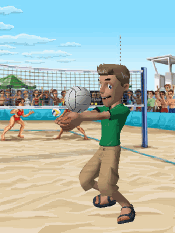Learning-Related Vision Problems
I was really amazed at how frequently problems with learning are linked with vision. It is also something that can be helped. I would like to give you some signs of vision problems that would interfere with school performance.
A major portion of all learning is done visually. Reading, spelling, writing, homework, work at the board. And now, with computers, even more of the learning is done relying on vision. Each of these vision skills asks the child to see and understand things that are within arm's length from the eyes.
Many childrens' visual levels do not meet the demands of the types of situations in the classroom. Which is where problems occur.
Clear vision and eyesight isn't all that we're discussing here. We're also talking about difficulties scanning, focusing and visual coordination skills for learning, and for getting meaning from reading. If these skills aren't developed, or are poorly developed, learning is difficult and stressful, and children will react in one or more of the following ways:
- They avoid visual work entirely, or as much as possible
- They attempt to do the work anyway, but with lowered understanding
- They often experience discomfort, fatigue, and short attention span.
- They adapt by becoming nearsighted, or by suppressing the vision of one eye
Vision problems don't cause learning disabilities, but poor vision skills can cause learning problems. Good vision skills provide a sound foundation for learning.
***Most school vision screenings test just the sharpness of distance eyesight, so many vision problems go undetected. A child with 20/20 distance eyesight may still have great difficulty doing vision tasks less than arm's length away.
Signs of Vision Problems
- Holding a book very close (7-8 inches away)
- Child, or adult, holds head at an extreme angle to the book when reading
- Covering one eye when reading
- Squinting when doing near vision work
- Constant poor posture when working close
- Moving head back and forth while reading instead of moving only eyes
- Poor attention span, drowsiness after prolonged work less than arm's length away
- Homework requiring reading takes longer than it should
- Child occasionally or peristently reports seeing blurring or double while reading or writing
- Child reports blurring or doubling only when work is hard
- Loses place when moving gaze from desk work to chalkboard, or when copying from text to notebook
- Child must use a marker to keep their place when reading
- Writing up or down hill, irregular letter or word spacing
- Child reverses letters (b for d) or words (saw for was)
- Repeatedly omits "small" words
- Rereads or skips lines unknowingly
- Fails to recognize the same word in the next sentence
- Misaligns digits in columns of numbers
- Headaches after reading or near work
- Child blinks excessively when doing near work, but not otherwise
- Rubs eyes during or after short periods of reading
- Comprehension declines as reading continues
- Child fails to visualize (can't describe what they've read)
Eliminating vision problems can quickly change academic performance.
I have more information to share with you at another time if you're interested. Or e-mail me at tachizuno4@yahoo.com and I can talk with you further.





5 Comments:
One interesting test is to check the child's eye tracking ability. Have them follow a pencil eraser.
Start by moving it from side to side, up and down.
Then bring it closer to their face. Often times if they have a problem with focusing, one of the eyes will lose track of the eraser, and you can imagine how much trouble they'd have reading!
We were all shocked a few weeks ago to find out that both our twin granddaughters had 20 200 vision. They're going into the 4th grade, and they've never had a teacher comment to our daughter about them moving to the front to see, and they've never complained about not being able to see! Amazing!! They've always been A/B students, but they must have been working extra hard to accomplish that.
I'd like to invite you to join our brand new, family friendly BLOG VILLAGE TopList. I think both your blogs would be a great addition.
You can find out more about it at the BLOG VILLAGE blog.
I'm surprised at how many of my students have vision problems that go uncorrected.
I took a graduate class in reading disorders in college. The professor was semi-retired and the biggest thing she preached to us was that if a kid can't read have their eyes tested.
She had done research in the local school district and concluded that 95% of all kids who have trouble reading have some kind of vision problem. Of the remaining 5%, 4 of the 5 had a hearing deficit of some kind.
Preach the mantra of vision screening!
There are many types of vision problem which can be happened with any people and they need immediate treatment for that problem to prevent serious condition.
Post a Comment
<< Home